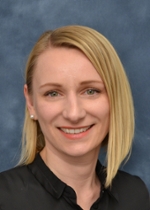Biologist, Center for Disease Control; Former Postdoc, Department of Microbiology and Immunology; 2012-2014

Interview by Claire Jarvis, PhD
Postdoctoral Fellow, Department of Chemistry
Dr Pulit-Penaloza obtained her undergraduate degree in Microbiology from the University of Lodz in Poland. She earned her MS and PhD in Biochemistry and Molecular Genetics from Georgia State University, where she studied the West Nile virus. Joanna moved to Emory University as a postdoc in 2012, where she worked for 2 years on a collaborative project developing microneedle patches for vaccine delivery. She currently holds a Biologist position in the Immunology and Pathogenesis branch at the Centers for Disease Control and Prevention, where she studies newly emerging influenza viruses.
What do you do at the CDC?
Typically my work is divided between lab bench work and office-based desk work, with meetings and trainings in between. I come to work around 7:30 am and usually leave around 4 pm. However, some lab projects require weekend work, same as in academia. When it comes to my desk work, I typically design experimental plans, analyze data, prepare presentations, write up reports/manuscripts and peer review manuscripts for different journals. In addition, I spend time keeping up with the literature and preparing orders for lab consumables.
My lab work primarily involves characterization of animal influenza viruses of zoonotic concern. The information that is gathered by our team is later included in the influenza virus pandemic risk assessments. In addition, my long term research goal is to better understand the viral and environmental factors that influence influenza virus transmissibility via air.
How did you get your job at the CDC?
Networking was very important. In graduate school and at Emory I met a lot of scientists who worked at the CDC, so I had a good understanding of the opportunities and career paths that were available there. A fellowship is an excellent opportunity to gain experience and training, and provide entry into a first job. There are a lot of different fellowships listed on the CDC website: I started at the CDC as an Oak Ridge Institute for Science and Education (ORISE) fellow. After gaining relevant experience I applied for a permanent position within the same division.
In what ways is working for a federal agency different from academia?
I observed my academic mentors struggling to obtain grant funding and knew I would not pursue a career in academia: in reality, there is not enough funding for every postdoc to continue in faculty jobs. The two remaining options for me were government or industry. I felt the CDC would be a good fit for me: I get to still work in the lab – I like the bench work – and I find great satisfaction in knowing that my results contribute to public health decisions made by CDC.
The difference between my job now and my academic job is that I do not need to apply for grants, our work is all funded by the government. Our projects are dictated by the CDC leadership, but there is always a little bit of room for designing experiments that address additional public health related research questions. On the other hand, PI’s in academia do have more control in choosing the specific areas of research they wish to pursue and are more at liberty to pursue individual research questions as long as they have the funding.
What did you enjoy about postdoctoral research at Emory?
There were a lot of seminars. It was really beneficial to see what other researchers were working on: you could meet people, approach them and ask questions that would be helpful for your own projects, learn about new techniques. The core and animal facilities were great in providing assistance with research projects. I also was lucky to be involved in a very big collaborative project between Georgia Tech and Emory, I got exposed to huge collaborations between different facilities which felt this was like something that happens in industry.
What advice would you give to postdocs interested in obtaining a job at the CDC?
Apply for fellowships. Look online even if you’re just getting information about CDC’s mission, research groups and the organizational structure. The CDC fellowships are very competitive so plan your application a year ahead, find out what the deadlines are and get all your documentation ready. Once you obtain a fellowship at the CDC then you can sign up for workshops, trainings, and courses offered at the CDC, and network. In addition to getting relevant work experience, completing additional training courses during the fellowship helps become a more competitive candidate for a specific permanent position. Also, the USA Jobs website is a great resource for anyone who is looking for a government job.
This interview was published in August, 2018.

